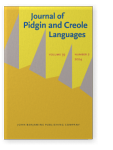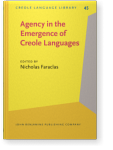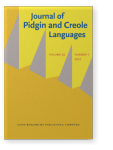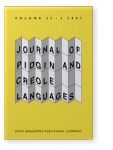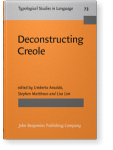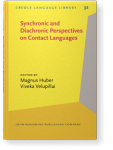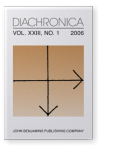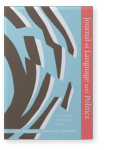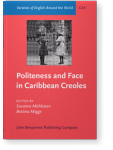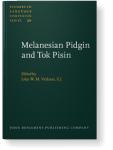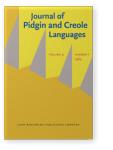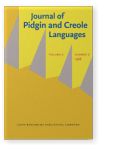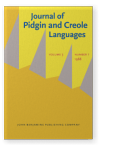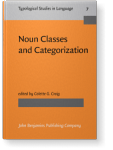Nicholas Faraclas
List of John Benjamins publications for which Nicholas Faraclas plays a role.
Journal
Title
Agency in the Emergence of Creole Languages: The role of women, renegades, and people of African and indigenous descent in the emergence of the colonial era creoles
Edited by Nicholas Faraclas
[Creole Language Library, 45] 2012. xiii, 246 pp.
Subjects Contact Linguistics | Creole studies | Historical linguistics | Sociolinguistics and Dialectology
2012 Women and colonial era creolization Agency in the Emergence of Creole Languages: The role of women, renegades, and people of African and indigenous descent in the emergence of the colonial era creoles, Faraclas, Nicholas (ed.), pp. 55–80 | Article
In this very preliminary commentary on the importance of women in the emergence of colonial era creole languages and cultures, the discussion will first focus on two emblematic cases of the momentous influence of women over the two major types of creolization that typify the colonial Caribbean: (1)… read more
2012 Marginalized peoples, racialized slavery and the emergence of the Atlantic Creoles Agency in the Emergence of Creole Languages: The role of women, renegades, and people of African and indigenous descent in the emergence of the colonial era creoles, Faraclas, Nicholas (ed.), pp. 1–40 | Article
A comparison of some of the assumptions that underpin current debates among linguists over the emergence of creole languages with some of those that undergird recent debates among historians over the emergence of racialized slavery reveals some common biases that render both of limited utility in… read more
2012 Influences of Houma ancestral languages on Houma French: West Muskogean features in Houma French Agency in the Emergence of Creole Languages: The role of women, renegades, and people of African and indigenous descent in the emergence of the colonial era creoles, Faraclas, Nicholas (ed.), pp. 185–214 | Article
By considering the emergence of Houma French in its political, social, and cultural context and by avoiding mono-causal scenarios for its development, we demonstrate how indigenous language patterns and indigenous agency can be traced, detected and validated in Houma French. An acknowledgement of… read more
2012 Sociétés de cohabitation and the similarities between the English lexifier Creoles of the Atlantic and the Pacific: The case for diffusion from the Afro-Atlantic to the Pacific Agency in the Emergence of Creole Languages: The role of women, renegades, and people of African and indigenous descent in the emergence of the colonial era creoles, Faraclas, Nicholas (ed.), pp. 149–184 | Article
Although most creolists agree that the Atlantic and Pacific colonial era English-lexifier Creoles have a number of linguistic forms and functions in common, no agreement has as yet been reached concerning the extent, the significance, or the source of these shared features. Over the past decades,… read more
2012 Marginalized peoples and Creole Genesis: Sociétés de cohabitation and the Founder Principle Agency in the Emergence of Creole Languages: The role of women, renegades, and people of African and indigenous descent in the emergence of the colonial era creoles, Faraclas, Nicholas (ed.), pp. 215–224 | Article
The tendencies toward decontextualization, mono-causal scenarios, and the erasure of the agency of marginalized peoples that have been identified and criticized in the preceding chapters are more often than not due more to the outmoded paradigm of science within which most linguists and other… read more
2012 Linguistic evidence for the influence of indigenous Caribbean grammars on the grammars of the Atlantic Creoles Agency in the Emergence of Creole Languages: The role of women, renegades, and people of African and indigenous descent in the emergence of the colonial era creoles, Faraclas, Nicholas (ed.), pp. 111–148 | Article
The now extinct indigenous languages of the insular Caribbean belonged to the North Arawakan sub-family. Given that no written grammatical descriptions seem to have survived of these languages, one of the only ways to gain some idea of what constituted their grammatical features is to make a… read more
2012 Indigenous peoples and the emergence of the Caribbean Creoles Agency in the Emergence of Creole Languages: The role of women, renegades, and people of African and indigenous descent in the emergence of the colonial era creoles, Faraclas, Nicholas (ed.), pp. 81–110 | Article
Contrary to most of the dominant discourses on Caribbean history, a close and critical re-examination and re-analysis of historical, archaeological, genetic, and other evidence suggests that the indigenous peoples of the insular Caribbean and their descendants were in the right places, at the right… read more
2012 African agency in the emergence of the Atlantic Creoles Agency in the Emergence of Creole Languages: The role of women, renegades, and people of African and indigenous descent in the emergence of the colonial era creoles, Faraclas, Nicholas (ed.), pp. 41–54 | Article
Because of their extreme marginalization in dominant colonial society, in more cases than not the significant role of people of African descent in shaping the history, politics, economics, cultures, and languages of the Caribbean and the rest of the Atlantic World has been consistently and… read more
2007 The complexity that really matters: The role of political economy in creole genesis Deconstructing Creole, Ansaldo, Umberto, Stephen Matthews and Lisa Lim (eds.), pp. 227–264 | Article
2007 12. No exception to the rule: The tense-aspect-modality system of Papiamentu reconsidered Synchronic and Diachronic Perspectives on Contact Languages, Huber, Magnus and Viveka Velupillai (eds.), pp. 257–278 | Article
2006 Review of Lipski (2005): A History of Afro-Hispanic Language: Five centuries, five continents Diachronica 23:1, pp. 196–200 | Review
2005 Globalization and the future of Creole languages Journal of Language and Politics 4:2, pp. 331–365 | Article
The plantation system that gave rise to many existing creoles can be said to be the prototype upon which the current wave of corporate globalization has been modeled (Linebaugh 1992). The daily wages received by the majority of workers worldwide at the beginning of the 21st century are not even… read more
2005 Ritualized insults and the African diaspora: Sounding in African American Vernacular English and Wording in Nigerian Pidgin Politeness and Face in Caribbean Creoles, Mühleisen, Susanne and Bettina Migge (eds.), pp. 45–72 | Article
1990 From Old Guinea to Papua New Guinea: A comparative study of Nigerian Pidgin and Tok Pisin Melanesian Pidgin and Tok Pisin: Proceedings of the First International Conference on Pidgins and Creoles in Melanesia, Verhaar, S.J., John W.M. (ed.), pp. 91–170 | Article
1989 Prosody and Creolization in Tok Pisin Journal of Pidgin and Creole Languages 4:1, pp. 132–139 | To be specified
1988 Nigerian Pidgin and the Languages of Southern Nigeria Journal of Pidgin and Creole Languages 3:2, pp. 177–197 | Article
Although several linguists have noted the similarities between the Atlantic Creoles and West African languages, none has systematically compared the structures of a geographically and genetically balanced sample of West African languages with a creolized language of the Atlantic Basin. This study… read more
1988 Rumors of the Demise of Descartes are Premature Journal of Pidgin and Creole Languages 3:1, pp. 119–135 | Article
